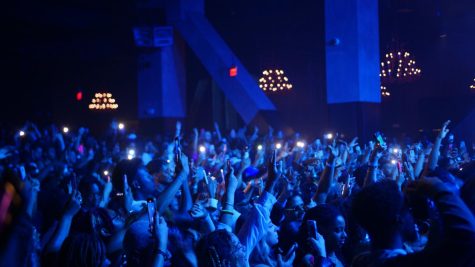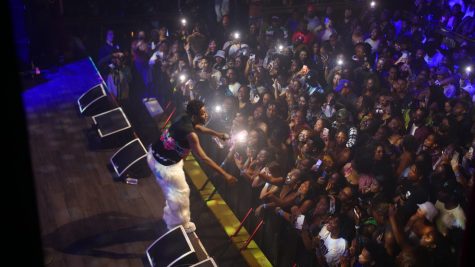Omah Lay, an Afrobeats musician from Nigeria, made a pit stop Sept. 15 at Boston’s Big Night Live during his “Boy Alone” album tour. Lay’s debut album follows his 2020 EP “Get Layd.”
Born and raised in the city of Port Harcourt, Nigeria, Lay vaulted into the international spotlight largely due to his pivotal single “Attention” with an electric feature from the Biebs himself—that’s Justin Bieber, for those who may not know. At just 25 years old, amassing nearly four million monthly listeners on Spotify and collaborations with notable Afrobeats artists like SPINALL and Tay Iwar, Lay has established himself as a notable presence in the genre.
Days before the concert, Lay’s media contact told me he was unavailable for an interview. I cordially accepted, but the fan in me told myself, I’m getting at least a statement from him. This became my mission long before I even arrived at the performance.
At 6:30 PM, four hours before Lay would enter stage left, the concert venue displayed harsh white LED lights and an empty floor.
However, judging by the wrapped-around-the-block line that gradually formed, his album had taken the hearts of many and given back very few.
I ducked under the barrier fence, gave my name, and entered backstage. It was just me, some photographers, and bustling employees. One was kind enough to get me a cup of water as I fiddled with the settings on my camera, ensuring I didn’t mess up a single shot of the organized chaos that was to come.
Opener WayUp Rui popped his head out of one of the small, orange-painted “green” rooms with a cloud of smoke trailing behind. I tapped my foot impatiently; there were another three hours until Lay would arrive. Rui donned a sleek Dior print cardigan and a charming smile. He stood on the metal walkway that led up to the stage, waiting patiently to perform.
The lights went down, and the now half-filled crowd was met with vibrant red lights that stretched across the dance floor, lapping the walls of the VIP section in the back. Rui had just a few more minutes until his first-ever opening for Lay.
“It’s a wonderful experience; a great opportunity,” Rui said in an interview with the Beacon.
He described his music as Afrobeats with some R&B and very “up-tempo,” which fittingly matched his bubbly personality.

Fans at Omah Lay’s concert.
The backstage double doors swung open, and everyone snapped their heads back as we did every time they opened that night. Alas, no Lay in sight.
Instead, it was UgoBoy, an Afrobeats musician who moved through the space confidently, with his shirt open and diamond chains sparkling, as if he was the headliner. He shamelessly stopped to strike a pose every time he found his reflection on the glass of a camera lens.
UgoBoy described his set as “electric music,” which has a “pulse…that will keep you moving whether you know the song or not.” He danced onto the stage and fulfilled his promise: the crowd, now three-quarters packed, had not a single motionless foot among it.
The DJ began feeding the hungry audience hints of Lay’s nearing presence. The final opener, Gingaman, walked through the double doors. He was zeroed in, eyes locked forward to the curtain. I shook his hand and attempted to get a statement, but one of his entourage shrugged me off. I didn’t mind because there was now only an hour until Lay’s arrival—my eyes stayed intermittently fixated on those black double doors.
Suddenly, an outstretched hand appeared in my line of sight, breaking my concentration; it was Gingaman. He apologized, saying he couldn’t hear me earlier. We stood close, nearly shouting above the blaring music, talking about the person that helped kickstart his passion for music.
“My mom,” Gingaman said with a soft smile. “She sings as well. And I also grew up in the church, so my expression is from different facets of life.”
He soon exited the venue with his crew, leaving the backstage eerily empty. Finally, a booming voice cut through the muffled music announcing Lay’s arrival. The double doors did not open, so I rushed to the other side backstage. People were congregating in a narrow hallway. The artist was about to make his stroll to the stage as the screams behind the curtains were increasing in anticipation.
Suddenly, a door I hadn’t seen before swung open, and the actual green room was visible, lined with Fiji bottles and large-paned windows. Lay, in white shag carpet pants and an equally enigmatic sweater vest, calmly walked to his entrance, a crew of people surrounding him. He stood beside me, less than an inch away from my face in that tight corridor.
I started to ask him, “How does—” when he began to melodically hum into the microphone, cutting me off. Lay stepped slowly towards the stage, low to the ground, before bursting through, immediately enchanting the audience, not with the magic of his singing or his fashion or the neon purple lights, but by the way he moved.
In UgoBoy’s terms, Lay’s energy was “electric.” He wasn’t just dancing; he was skipping across the stage, each white boot slapping the wood with intent: thud, thud, to the beat.
He commanded the audience to move as well, even once to hug their neighbor, to pervade love throughout the venue. A couple of Fiji bottles sat in front of him, pressed against the vibrating speakers.
He started with tracks like “tell everybody” and “bend you,” a couple of hits off of “Boy Alone.” As his set continued, he started to play songs separate from the album, like “PAMI,” which features Wizkid, the most successful Afrobeats musician to date, and “Infinity” with Olamide.

Lay “commands the crowd” at his Boston concert.
The crowd’s energy remained high all night long, regardless of each song’s popularity. Honestly, I couldn’t tell if it was Lay’s presence or the song that impacted his audience so much. Sure, phones recorded his every movement but certainly not as many as a typical concert. Most people were present, away from social media. His entire set kept a constant heartbeat anyone within a mile radius must’ve felt.
As entertaining as it all was, I couldn’t help but desire just one statement from Lay. After all, it’s what I’d set out to do. So, I went backstage a couple of minutes before he was to end. I stood in the hallway timidly; my camera dangled from my neck.
A round of applause erupted and Lay descended towards the green room with his posse, not even a single bead of sweat glistening on him. I waved my hand and said, “You killed it. How do you think you did tonight?”
He took his left ear plug out and cocked his head. Lay produced an audible, “Huh?”
I pivoted to a question I thought was more interesting: “How does the crowd here compare to Nigeria?”
Before he could let out anything else, his bodyguard grunted, “Don’t worry about it.”
The door shut with Lay and the Fiji bottles inside. I saw neither again.
I spent the whole concert imagining how I would construct this piece around a statement from Lay, so when I left empty handed, I felt defeated and a bit dumbfounded about how I’d attempt this review. I mean, I guess I could use Lay’s “huh” since Oxford’s Dictionary deems it a word, but what would I do with that?
These thoughts lasted only a second before I remembered all the outstanding moments: every smile, every handshake, and every time the door swung open were imprinted vividly, carbon-copied. Big Night Live lived up to its name due to the assemblage of vibes, jives, and good times brought by WayUp Rui, UgoBoy, Gingaman, Omah Lay, and too many others to count.